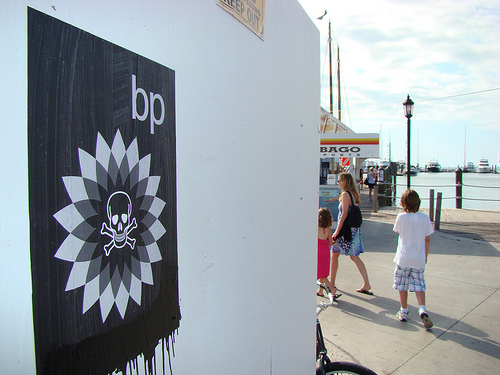
Flickr/<a href="http://www.flickr.com/photos/tsand/4638861417/">tsand</a>
Rep. Ed Markey (D-Mass.) ripped oil corporation BP today by claiming they were low-balling the spill’s damage to dodge more than a billion dollars in financial liabilities. Markey’s attacks come on the same day an independent report put the BP oil spill at between 12,000 and 19,000 barrels a day, far exceeding BP’s 1,000 to 5,000 estimate. “What’s clear is that BP has had an interest in low-balling the size of their accident, since every barrel spilled increases how much they could be fined by the government,” said Markey, who chairs the select committee on Energy Independence and Global Warming and the Energy and Environment subcommittee.
According to Markey, the difference between BP’s and independent scientists’ estimates on the spill’s size amounts to tens of millions of dollars everyday. If the spill were really 1,000 barrels per day, the fines would total between $5 to $15 million each day; if 14,000 barrels a day, then BP is looking at fines of $14 to $42 million every day. The current governing financial liabilities for oil spills like BP’s, the Oil Pollution Act of 1990, mandates fines of $1,000 per barrel or, in the case of “gross negligence,” $3,000 per barrel. All told, BP, using scientists’ projections on the Gulf spill, the oil giant could face fines of $444 million and $2.1 billion now on the 37th day of the spill.
Here’s Markey’s full release on BP’s financial liabilities:
Following the release of a report on the flow rate of the oil spill by a technical team assembled by the Obama administration, Rep. Edward J. Markey (D-Mass.) today continued to raise questions about BP’s potential motivations to low-ball the flow rate and size of the spill, and released new documents showing BP knew the spill could have been much bigger than they claimed.
The report, conducted by the National Incident Command’s Flow Rate Technical Group, found that the spill was likely between 12,000 and 19,000 barrels a day, far above the 1,000-5,000 barrels a day BP estimated for most of the spill’s duration. Rep. Markey has engaged with numerous independent scientists on this issue who claimed the spill was much larger than BP’s estimates.
“Now we know what we always knew—this spill is much larger than BP has claimed,” said Rep. Markey, who chairs the Select Committee on Energy Independence and Global Warming and the Energy and Environment Subcommittee in the Energy and Commerce Committee. “What’s clear is that BP has had an interest in low-balling the size of their accident, since every barrel spilled increases how much they could be fined by the government.”
Yesterday Rep. Markey pressed this point with Interior Secretary Ken Salazar, citing documents he obtained from BP that showed BP knew as early as a week after the explosion on the Deepwater Horizon rig that the spill could have been much higher than their initial estimate of 1,000 barrels. Secretary Salazar agreed with Rep. Markey that BP could have a financial interest in underestimating the size of the spill.
The documents can be found here
One document, dated April 27, shows that BP’s high estimate for the daily rate of the spill was 14,266 barrels per day, well within the midrange of today’s technical group report. Yet one day later, BP was asserting to the public that the spill was only 1,000 barrels a day—their low estimate for the size of the spill.
The implications for BP’s financial liability are directly tied to the size of the spill. Under current law—the Clean Water Act as amended by the Oil Pollution Act of 1990, following the Exxon Valdez disaster—a company that spills oil is subject to fines up to $1,000 per barrel, or up to $3,000 per barrel in the case of gross negligence.
For BP, the difference between an estimate of 1,000 barrels per day and one of 14,000 barrels a day could really be the difference between $5 to $15 million per day in fines versus $14 to $42 million per day. That means, at the end of yesterday, the 37th day of the spill, the difference could potentially be between $37 million in fines or $1.5 billion in fines, according to BP’s own estimates from the documents.
According to the range reached by the technical group today, BP could be subject to between $444 million and $2.1 billion in potential fines for the oil spilled thus far.
“BP has to stop protecting their liability and start dealing with the reality of the size of this spill,” said Rep. Markey. “Knowing the size of the spill is vital to all facets of this spill, from response to recovery to accountability.”
If you appreciate our BP coverage, please consider making a tax-deductible donation.













